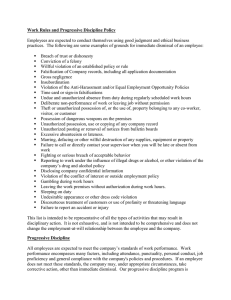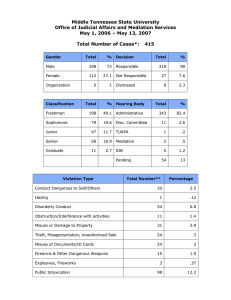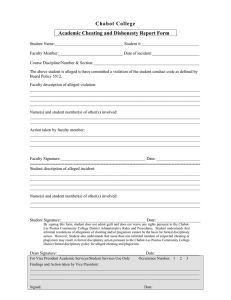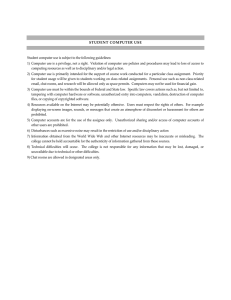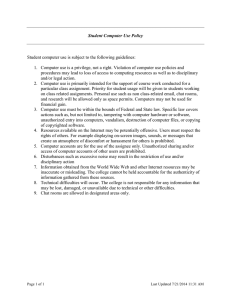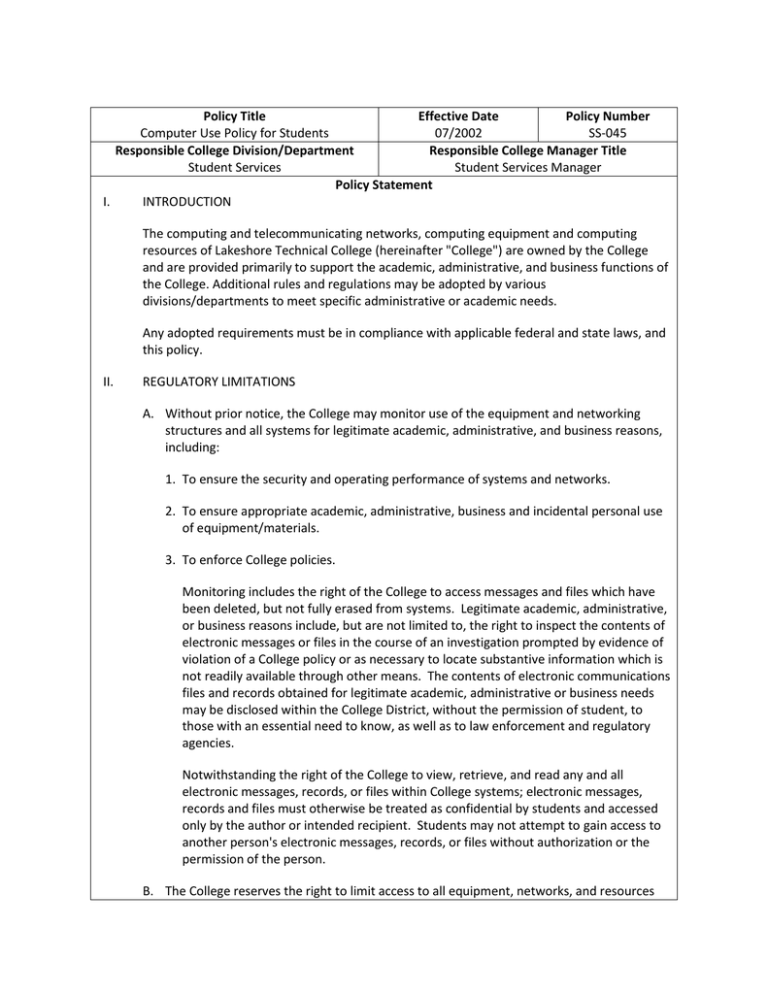
Policy Title
Effective Date
Policy Number
Computer Use Policy for Students
07/2002
SS-045
Responsible College Division/Department
Responsible College Manager Title
Student Services
Student Services Manager
Policy Statement
I.
INTRODUCTION
The computing and telecommunicating networks, computing equipment and computing
resources of Lakeshore Technical College (hereinafter "College") are owned by the College
and are provided primarily to support the academic, administrative, and business functions of
the College. Additional rules and regulations may be adopted by various
divisions/departments to meet specific administrative or academic needs.
Any adopted requirements must be in compliance with applicable federal and state laws, and
this policy.
II.
REGULATORY LIMITATIONS
A. Without prior notice, the College may monitor use of the equipment and networking
structures and all systems for legitimate academic, administrative, and business reasons,
including:
1. To ensure the security and operating performance of systems and networks.
2. To ensure appropriate academic, administrative, business and incidental personal use
of equipment/materials.
3. To enforce College policies.
Monitoring includes the right of the College to access messages and files which have
been deleted, but not fully erased from systems. Legitimate academic, administrative,
or business reasons include, but are not limited to, the right to inspect the contents of
electronic messages or files in the course of an investigation prompted by evidence of
violation of a College policy or as necessary to locate substantive information which is
not readily available through other means. The contents of electronic communications
files and records obtained for legitimate academic, administrative or business needs
may be disclosed within the College District, without the permission of student, to
those with an essential need to know, as well as to law enforcement and regulatory
agencies.
Notwithstanding the right of the College to view, retrieve, and read any and all
electronic messages, records, or files within College systems; electronic messages,
records and files must otherwise be treated as confidential by students and accessed
only by the author or intended recipient. Students may not attempt to gain access to
another person's electronic messages, records, or files without authorization or the
permission of the person.
B. The College reserves the right to limit access to all equipment, networks, and resources
when federal or state laws or College policies are violated, or when College contractual
obligations or College operations may be impeded.
C. The College may authorize confidential passwords or other secure entry identification;
however, students are to have no expectation of privacy in the material sent or received
by them over the College computing systems or networks. While general content review
will ordinarily not be undertaken, monitoring of this material may occur for the reasons
specified above.
Computer passwords are not, and are not intended as a guarantee of confidentiality or
privacy. Students may not use a password, access a file, or retrieve any stored
information unless authorized to do so.
Each individual user is responsible for the proper use of his/her assigned account,
including password security. Users must not share computer accounts or disclose access
information to unauthorized persons.
D. The College generally does not monitor or restrict material located in College computers
housed within a private domicile or on non-college computers, whether or not such
computers are attached or able to connect to campus networks.
E. All material prepared and used for purposes and posted to or sent over College
computing and other telecommunicating equipment, systems or networks must be
accurate and must correctly identify the author and receiver.
F. No person shall make illegal copies of software. Illegal copies of software may not be run
on any District computer. The Information Technology staff will take the necessary action
to prevent violations of this requirement. Students are responsible for any and all liability
resulting from violation of this prohibition.
G. The College is not responsible for the loss of data or interference with files which may
occur in the course of maintenance of networks or equipment.
H. The College is not responsible for lost or deleted files which have been saved on disks.
III.
PERMISSIBLE USE
Students are required to adhere to this policy and any related College rules, regulations and
procedures for work produced on computing equipment, systems and networks. Students
may access these technologies for academic, administrative, business and incidental personal
uses, if the following restrictions are followed:
A. The use is lawful under federal or state law.
B. The use is not prohibited by Lakeshore Technical College District Board, College, or
institutional policies.
C. The use does not damage or overload College computing equipment or systems, or
otherwise harm or negatively impact the systems’ performance.
D. The use does not contravene copyright or trademark law.
E. The use does not result in commercial gain or private profit (other than as allowable
under College intellectual property policies).
F. The use does not state or imply College sponsorship or endorsement.
G. The use does not violate state or federal laws or College policies against race or sex
discrimination, including, but not limited to, racial slurs, gender specific comments,
comments on sexual orientation or sexual harassment.
H. The use does not involve unauthorized passwords, identifying data, or any other action
that attempts to circumvent, disable or overload system security, or in any way attempts
to gain unauthorized access.
I.
The use does not involve activities which interfere with or disrupt network users, services
or equipment, to include, but not limited to:
a. Distribution of unsolicited advertising or mass mailings;
b. Propagation of computer worms or viruses; and
c. Downloading and/or running any destructive or disruptive programs on College
computer systems.
J.
The use does not involve accessing or attempting to access by "hacking" or any other
unauthorized entry, materials, information, resources, communication devices, or the
files of other users, which the student reasonably understands to be restricted to persons
other than the student. Intentional interception of any electronic communication is
considered unauthorized access and may violate the Electronic Communications Privacy
Act.
K. The use does not involve in any manner disabling or inactivating virus scanning software
or restrictive filters.
IV.
ILLEGAL ACTIVITY
A. Any illegal use of the network, or its use in support of such activities, is strictly prohibited.
Illegal activities are defined as a violation of local, state, and/or federal laws.
B. The submission, publication or transmission of information or data of any type for the
purpose of planning, preparing or engaging in criminal activity of any type is strictly
prohibited.
C. College officials will report actual or suspected criminal conduct to law enforcement
authorities.
V.
VIEWING OR DISTRIBUTING OBSCENE OR PORNOGRAPHIC MATERIALS
A. Students may not intentionally access, download, store, or transmit obscene or
pornographic sites, materials, files or messages through the College District Information
Systems or using any College District computing and telecommunicating networks,
equipment or computing resources to include, but not limited to, any sites, materials,
messages, or files, which:
1. Contain adult oriented or pornographic images, written materials, or discussions;
2. Are restricted to adults or persons age 21 or over because of adult oriented sexual or
violent content;
3. Contain sexually explicit images or materials of any type, to include images of the
human body which depict nudity or sexual excitement, as well as actual or simulated
sexual acts.
Conduct of this character is not, and will not be recognized as appropriate or
authorized use of College computing equipment, information systems and networks
for personal, academic, administrative, or business purposes.
B. Violation of the foregoing section IV., A., of this policy will result in disciplinary action
under section VI., below.
VI.
SUSPENSION OF PRIVILEGES BY MANAGER OF STUDENT SERVICES OPERATIONS
A. The College's Manager of Student Services Operations may suspend a student's access
privileges for as long as necessary to protect the College's computing resources. As soon
as practicable following the suspension, the Manager of Student Services Operations
must take the following actions:
1. The student must be provided with notice of the computing resources suspension and
the reasons for it.
2. The student must be given an opportunity to meet with the Manager of Student
Services Operations to discuss the suspension if the student requests it.
3. Following the meeting, the student must be notified that the student may appeal to
the Manager of Student Services Operations' immediate supervisor if the student is
dissatisfied with the outcome of the meeting.
B. The Manager of Student Services Operations may refer the matter for action under the
student code of conduct.
VII.
VIOLATION OF POLICY
A. Any violation of this policy will be considered “misconduct” under the College student
code of conduct and the offending student will be subject to the process as outlined.
Violations should be reported as provided under the code.
B. Sanctions for violation of this policy may include a revocation or suspension of access
privileges in addition to the sanction provided under the student code of conduct.
C. Violations of federal or state law may be referred for criminal or civil prosecution.
D. Disciplinary decisions will be based upon, but will not be limited to, the following:
1. The nature of the misconduct, to include the character of materials, files, messages or
sites, created, accessed, sent, viewed, or damaged.
2. The frequency with which unauthorized materials, files, sites or messages were
accessed, downloaded, stored, transmitted, or damaged.
3. The time of day during which the conduct occurred.
4. Whether other persons were involved in any way, either voluntarily or involuntarily.
5. Whether the conduct is subject to criminal prosecution.
6. Whether the conduct has resulted in a complaint by another person.
7. Impact upon other students.
8. Prior disciplinary record.
9. Cost incurred by the College.
E. Unauthorized or improper use of a student account, password, or access information will
not excuse the student from disciplinary action, if the student failed to comply with the
requirements of this policy regarding network security.
VIII.
APPLICATION OF PUBLIC RECORDS LAW
All information created or received for work purposes and contained in College computing
equipment files, servers, or electronic mail (email) depositories are public records and are available
to the public unless an exception to the Wisconsin Public Records Law applies. This information may
be purged and destroyed only in accordance with the College records retention schedule.
Reason for Policy
The use of this equipment and technologies is governed by federal and state law, and College policies
and procedures.
Cross References and Legal Review
Created/Adopted: 7/2002
Reviewed/Revised: 04/01/06
Legal Reference:
Cross Reference: Student Conduct, Student Discipline, Microcomputer Software Protection, Material
Resources Management, American with Disabilities Act, Equal Opportunity and Affirmative Action
Legal Counsel Review and Approval:
Board Policy: III.A. General Executive Constraint, III.B. People Treatment, III.F. Asset Protection
Definitions

